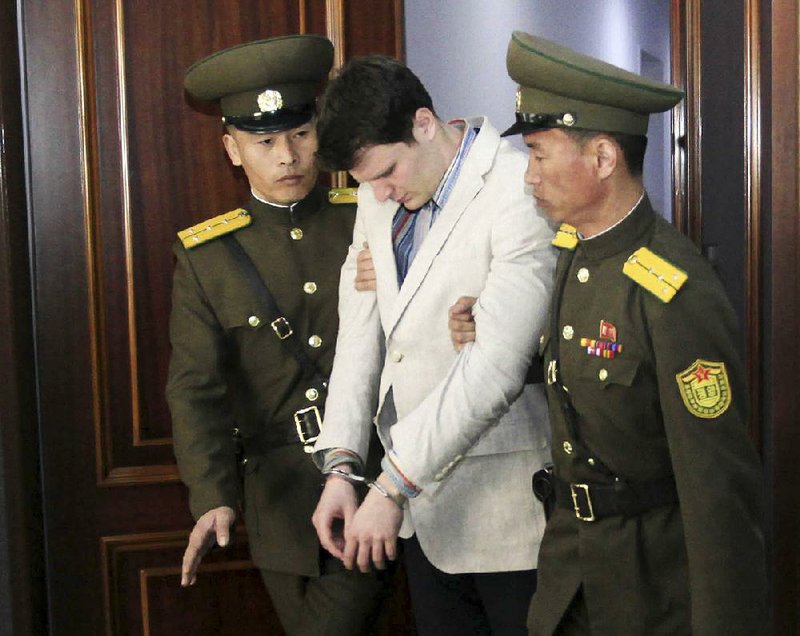BEIJING -- North Korea issued a $2 million bill for the hospital care of comatose American Otto Warmbier, insisting that a U.S. official sign a pledge to pay it before being allowed to fly the University of Virginia student from Pyongyang in 2017.
The main U.S. envoy sent to get Warmbier signed an agreement to pay the medical bill on instructions passed down from President Donald Trump, according to two people familiar with the situation. They spoke on the condition of anonymity because they were not authorized to discuss the matter publicly.
The bill went to the Treasury Department, where it remained unpaid throughout 2017, the people said. However, it is unclear whether the Trump administration later paid the bill, or whether it came up during preparations for Trump's two summits with Kim Jong Un.
The White House declined to comment. "We do not comment on hostage negotiations, which is why they have been so successful during this administration," White House press secretary Sarah Huckabee Sanders wrote in an email.
Trump, as recently as Sept. 30, asserted that his administration paid "nothing" to get American "hostages" out of North Korea.
Warmbier, who was 21, fell into a coma for unknown reasons the night he was sentenced to 15 years in prison with hard labor in March 2016.
He was convicted on charges stemming from pulling down a propaganda sign in a Pyongyang hotel in the early hours of Jan. 1, 2016, where it was deemed a "hostile act against the state."
After his sentencing, the North Koreans held on to the comatose student for another 15 months, not telling American officials until June 2017 that he had been unconscious all that time. News of his condition sparked a frantic effort led by Joseph Yun, the State Department's point man on North Korea at the time, to get Warmbier home.
Yun and an emergency medicine doctor, Michael Flueckiger, traveled to Pyongyang on a medical evacuation plane. They were taken to Friendship Hospital in the diplomatic district, a clinic where only foreigners are treated, and found Warmbier lying in a room marked "intensive care unit," unresponsive and with a feeding tube in his nose.
Flueckiger examined Warmbier and asked the two North Korean doctors, who had a thick pile of charts, questions about the lab work, scans and X-rays they had done.
Afterward, they went to a meeting room where the talks to free Warmbier began.
"I didn't realize what a negotiation it was going to be to secure his release," said Flueckiger, who is medical director of Phoenix Air Group, an aviation company based in Cartersville, Ga., that specializes in medical evacuations.
North Korean officials asked the doctor to write a report about his findings. "It was my impression that if I did not give them a document that I could sign off on, that would cause problems," Flueckiger said in an interview.
But the American said he did not have to lie in his report. Whatever had happened to put Warmbier into that state, it was "evident" that he had received "really good care" in the hospital, he said. The doctors had done "state-of-the-art resuscitation" to revive Warmbier after he suffered a catastrophic cardiovascular collapse, and it was "remarkable" that he had no bedsores, Flueckiger said.
"Would I have lied to get him out of there? Maybe I would have," he said. "But I didn't have to answer that question."
The North Korean officials handed Yun a bill for $2 million, insisting that he sign an agreement to pay it before they would allow him to take Warmbier home, according to the two people familiar with the situation.
Yun called then-Secretary of State Rex Tillerson and told him about the bill. Tillerson called Trump. They instructed their envoy to sign the piece of paper agreeing that the $2 million would be paid, the two people said.
Father Fred Warmbier accused North Korea of beating and torturing Otto in detention, although doctors who examined him at the University of Cincinnati Medical Center said there was no evidence of that. His parents requested that an autopsy not be performed.
North Korea insisted that Warmbier became sick after eating pork and spinach, but it also said he had a severe allergic reaction to sedatives he was given.
The Warmbiers have blamed Kim for their son's death, but Trump has said he believes the North Korean leader's claims that he did not know about the student's treatment.
"Otto Warmbier was mistreated by North Korea in so many ways, including his wrongful conviction and harsh sentence, and the fact that ... they refused to tell his family or our country about his dire condition they caused," said Sen. Rob Portman, R-Ohio. "No, the United States owes them nothing. They owe the Warmbier family everything."
Information for this article was contributed by Donna Cassata of The Washington Post.
A Section on 04/26/2019
